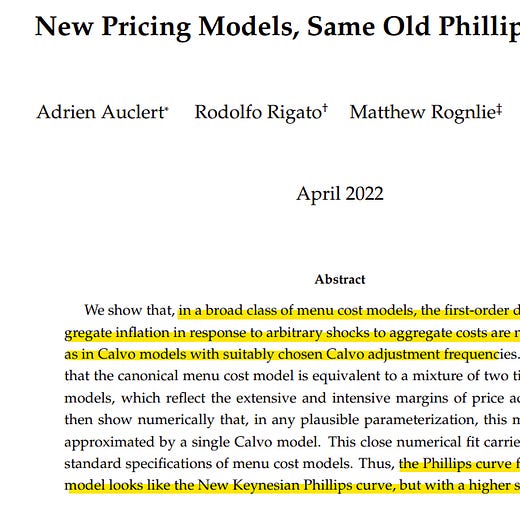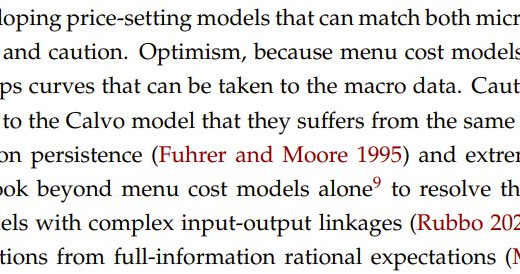Best of #econtwitter - Week of April 24, 2022 [2/3]
Apr 25, 2022
Welcome readers old and new to this week’s edition of Best of Econtwitter. Thanks to those sharing suggestions, over email or on Twitter @just_economics.
This is part two of three.
Paper summary threads

Florian Ederer@florianederer
Autocracies overstate yearly GDP growth by as much as 35% when checked with more objective nighttime lights activity.
Democracies have a much better economic track record once GDP figures are adjusted for manipulation.


Luis R. Martinez @LuisRMartinezA
"How Much Should We Trust the Dictator's GDP Growth Estimates?" is now forthcoming at the Journal of Political Economy: https://t.co/sa31QJOtvS
2:47 PM · Apr 20, 2022
7 Reposts · 28 Likes

Robert Ulbricht@ulbricht_robert
My work on Mismatch Cycles (with @ana_gfigueiredo and @isaacbaley) just got accepted @JPolEcon. A summary:
In the data we see a lot of mismatch btwn workers' skills and skill requirements posed by their jobs (eg @fatihguvenen, @BKuruscu, @econtanaka and @DavidWiczer).
1/N
2:41 PM · Apr 23, 2022
30 Reposts · 236 Likes

Alex Eble@alexeble
Why do certain beliefs persist in the face of strong evidence that contradicts them?
How do some societal inequalities persist across generations?
This 🧵 explains a new paper I have with @trifen_hu studying these questions through the lens of #gender
nature.com/articles/s4156…
nature.com
Gendered beliefs about mathematics ability transmit across generations through children’s peers - Nature Human Behaviour

3:58 PM · Apr 19, 2022
95 Reposts · 288 Likes

Justin Sandefur@JustinSandefur
The Great Indian Poverty Debate, 2.0
A new World Bank paper says Indian poverty has fallen, but is higher than we thought. A rival study from India's IMF rep says India, like China, is approaching zero poverty.
I tried to parse the debate:
cgdev.org/blog/great-ind…
1/
cgdev.org
The Great Indian Poverty Debate, 2.0

6:23 PM · Apr 19, 2022
220 Reposts · 761 Likes

Lukas Freund@_LukasFreund_
Elegant new working paper -- "New Pricing Models, Same Old Phillips Curves?" -- by @a_auclert, Rigato, Rognlie, @ludwigstraub.
👉 The aggregate Phillips curve for a menu cost model looks like the New Keynesian Phillips curve, but with a higher slope.
web.stanford.edu/~aauclert/new_…


2:05 PM · Apr 23, 2022
8 Reposts · 64 Likes

Paul Goldsmith-Pinkham@paulgp
Reading through this now, and I think this is gonna be a great paper for linking how "reduced-form" and "structural" folks think about estimation. (Not surprising given the team)
Some brief translations to whet your appetite for reading this... (I am still in progress!) 1/

Peter Hull @instrumenthull
What do structural models identify in a general potential outcomes framework? The answer depends on whether the instruments are "included" or "excluded"
New great-looking paper from a fantastic research team
https://t.co/uOeCdb0qFq https://t.co/gULxXUZTVC
1:36 PM · Apr 22, 2022
87 Reposts · 418 Likes

Kirill Borusyak@borusyak
📢@XJaravel, @jannspiess and I just posted a new draft of "Revisiting Event Study Designs: Robust and Efficient Estimation"
As before:
- Challenges of diff-in-diff estimation by OLS
- Robust and efficient imputation estimator
NEW:
- Application to MPC!
arxiv.org/pdf/2108.12419…

1:41 PM · Apr 21, 2022
53 Reposts · 300 Likes

K. Kıvanç Karaman@kivanc_karaman
Did gold/silver standard keep the value of money stable? Did it allow states to insulate monetary policy from politics? The short answer is no. Because politics cannot be kept out of monetary policy. The figure below summarizes the long-run evidence.

3:56 PM · Apr 20, 2022
18 Reposts · 79 Likes

Seema Jayachandran@seema_econ
Monetary rewards for undertaking a desirable behavior partly offset people's costs to change their behavior; it's the remaining money that improves their economic well-being. My new short paper on this idea, applied to payments for conservation. seemajayachandran.com/pes_tradeoff.p…

2:11 PM · Apr 18, 2022
30 Reposts · 130 Likes
Language models pop-up section
Context: https://beta.openai.com/playground/

Ben Golub 🇺🇦@ben_golub

3:36 AM · Apr 20, 2022
5 Reposts · 103 Likes

Ben Golub 🇺🇦@ben_golub
GPT-3 passes the Turing test for Twitter critique of economic thought with flying colors

4:50 AM · Apr 21, 2022
78 Reposts · 720 Likes

Ben Golub 🇺🇦@ben_golub
@instrumenthull unsafe content indeed

4:41 AM · Apr 21, 2022
2 Reposts · 14 Likes

quan le 🍚🥢@qlquanle
grading papers in the age of gpt-3 gonna be fun

11:58 AM · Apr 20, 2022
49 Reposts · 542 Likes

Paul Novosad@paulnovosad
I hope the staff at @OpenAI are checking their server logs carefully.

2:11 PM · Apr 21, 2022
858 Reposts · 7.78K Likes
Interesting discussions

Ben Golub 🇺🇦@ben_golub
For almost every signaling reason to do something, there is a countersignaling ("I'm so cool I don't have to worry about this”) account of the opposite behavior.
Examples 🧵

April Burrage @AprilBurrage
I am not a fan of Beamer but I have to use it. Why is this the standard in economics?
1:36 PM · Apr 19, 2022
11 Reposts · 136 Likes

Ben Golub 🇺🇦@ben_golub
A favorite of mine: refraining from asking questions in class for fear of revealing ignorance. Familiar to many students.
A lovely guy, widely held to be the smartest in his MIT econ cohort, would ask "naive" questions freely. Huge public good.
1:55 PM · Apr 19, 2022
1 Repost · 94 Likes

Kevin Bryan@Afinetheorem
@ben_golub Forgot I sent home luggage w/ my dress clothes before interview at the Fed at age 22. Showed up in sneakers & a polo. Got the job anyway (I apologized and explained!); later heard the staff econs at lunch thought I must be some superstar student. Countersignaling w/ errors!
5:05 PM · Apr 19, 2022
2 Reposts · 18 Likes

Kevin DeLuca 🤝@cantstopkevin
Advice for econ depts: if a job candidate misses their flight, you should actually be MORE likely to hire them. On time for every flight = wasting lots of time at the airport. Missing the job interview flight shows they are just being super efficient even when the stakes are high
5:17 PM · Apr 20, 2022
1 Repost · 254 Likes

